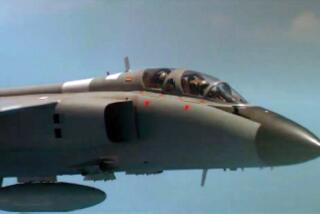Obama, key advisors review war strategy
- Share via
WASHINGTON — President Obama, amid political contretemps at home and expanding international turmoil over the disputed Afghan election, summoned his war Cabinet to the White House on Wednesday for a high-stakes review of his Afghanistan strategy.
The session, which produced no announcements concerning additional troops or strategy, came on a day in which the highest-ranking American serving in the United Nations mission in Afghanistan was fired. Peter W. Galbraith, who had pushed for more aggressive steps to deal with alleged vote fraud, had clashed with Kai Eide, the senior U.N. representative in Afghanistan. in what one U.S. official called “an ugly dispute.”
The White House billed Obama’s war strategy meeting as a major discussion of options, and it offered the first opportunity for Army Gen. Stanley A. McChrystal, the top U.S. and allied commander in Afghanistan, to address the president directly since submitting a military assessment that called for an expanded counterinsurgency campaign and pointed to the likely need for more troops.
With no major decisions reached, another meeting was set for Wednesday. White House Press Secretary Robert Gibbs said Obama remains committed to his goals, to “disrupt, dismantle and destroy Al Qaeda and its extremist allies” and prevent the reemergence of safe havens.
Top military officials have argued that those goals represent a broad and difficult mandate that requires the kind of counterinsurgency strategy outlined by McChrystal.
But White House officials want to examine alternatives that could focus on more limited objectives, such as training Afghan security forces or seeking to kill Al Qaeda leaders.
U.S. public support for the war has declined in recent months as casualties have mounted. The military said that an American service member was killed Wednesday in a suicide attack in eastern Afghanistan. So far this year, 223 U.S. military personnel have been killed.
Obama this year sent 21,000 additional U.S. troops to help provide a secure environment for the August presidential election in Afghanistan. But the vote was marred by charges of fraud as the incumbent, Hamid Karzai, claimed a disputed victory. Watchdog groups have said that there were more than enough questionable votes to necessitate a runoff against his chief rival, former Foreign Minister Abdullah Abdullah.
“I don’t think you can overstate the importance of the elections to the discussions going on now,” said a military official, who spoke about the meeting on condition of anonymity. “There is such uncertainty about the national government. We don’t know who we will be dealing with in eight months.”
The debate over how to handle the fraud allegations prompted U.N. officials Wednesday to fire Galbraith, a former U.S. ambassador who is close to Richard Holbrooke, the Obama administration’s special envoy to Afghanistan and Pakistan.
Before the election, Galbraith sought to reduce potential fraud by advocating such measures as closing little-used “ghost” polling places. But Eide of the U.N. sided with Afghan officials who resisted.
After the election, Galbraith said information compiled by the U.N. on the extent of the fraud should be shared with Afghan election authorities, but Eide vetoed the move.
Galbraith said he supports the decision by a U.N.-backed body, the Electoral Complaints Commission, to order a partial recount based on a statistical sampling. That is to begin within days, and a decision is expected this month on whether a runoff will be held.
--
cparsons@latimes.com
Times staff writers Janet Hook in Washington and Laura King in Kabul, Afghanistan, contributed to this report.
More to Read
Sign up for Essential California
The most important California stories and recommendations in your inbox every morning.
You may occasionally receive promotional content from the Los Angeles Times.











